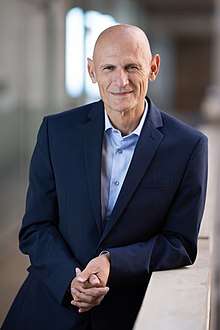Juan Carlos Izpisua Belmonte
Juan Carlos Izpisua Belmonte (born 1960 in Hellín, Albacete) has been a professor in the Gene Expression Laboratories at the Salk Institute for Biological Studies in La Jolla, California since 1993. In 2004, he helped to establish the Center for Regenerative Medicine in Barcelona and was its Director between 2004 and 2014.[1][2]

Education
Izpisua graduated from the University of Valencia, Spain with a bachelor's degree in Pharmacy and Science. He then earned a master's degree in Pharmacology from the same university before moving on to complete his Ph.D. in Biochemistry and Pharmacology at the University of Bologna, Italy and the University of Valencia, Spain. He followed that with a stage as a postdoctoral fellow in different institutions, including the European Molecular Biology Laboratory (EMBL), in Heidelberg, Germany and University of California, Los Angeles (UCLA), Los Angeles, USA prior to moving to the Salk Institute in 1993.[1]
Career
He is a main catalyzer in one of today's most promising areas of biomedicine: regenerative medicine. His work may help to discover new molecules and specific gene/cell treatments to prevent and cure diseases affecting mankind both in the adult and embryonic stages, as well as inducing endogenous in vivo regenerative responses that may allow for tissue and organ regeneration in humans. It also may contribute to increase our knowledge of aging and aging-associated diseases, thereby leading to healthier aging and increased lifespan.[3][4][5]
His conceptual discoveries and methodologies for regenerative medicine include:
- Elucidating some of the key cellular and molecular bases of how an organism with millions of cells develops from a single cell embryo after fertilization.[6][7][8][9][10][11][12]
- Seminal discoveries towards understanding the molecular basis underlying somatic cell reprogramming and methodologies both in vitro and in vivo for the differentiation of human stem cells into various cells types, tissues and organoids.[13][12][14][15]
- Development of novel stem cell models of human aging and aging-associated diseases, and discovery of new drivers of aging.[13][16][17]
- Novel genetic and epigenetic technologies to both treat, and prevent the transmission, of mitochondrial and nuclear DNA originated diseases.[13][18][19][20]
Belmonte has over 450 publications describing these results. He has also received several awards and honors over the years, a notable one was the naming of a secondary school, Instituto Enseñanza Secundaria (IES) Izpisua Belmonte, in his hometown of Hellín, Albacete, Spain.[21] In October, 2018, Belmonte was named by Time Magazine as one of the 50 Most Influential People in Healthcare of 2018.[22]
See also
- Xenotransplantation
- Chimera (genetics)
- Gene Therapy
- Genome editing
References
- "Old Izpisua Belmonte Website". Archived from the original on 2012-01-25.
- "CMRB Director".
- "NYT Regeneration".
- "NYT Aging".
- "NYT Gene Editing".
- "El Pais Regeneration".
- "El Pais Asymmetry".
- "El Pais Wing Gene".
- "El Pais Gene".
- "El Pais Chimera".
- "El Pais Organoids".
- "Stat Human Pig Chimera".
- "Salk Institute Profile".
- "Nature Fanconi Anemia".
- "Nature Medicine Wound Healing".
- "SDUT Profile".
- "New Yorker Aging".
- "WP Gene Therapy".
- "LAT Gene Editing".
- "WP Gene Editing".
- "IESIB".
- "2018 Time Health Care 50".